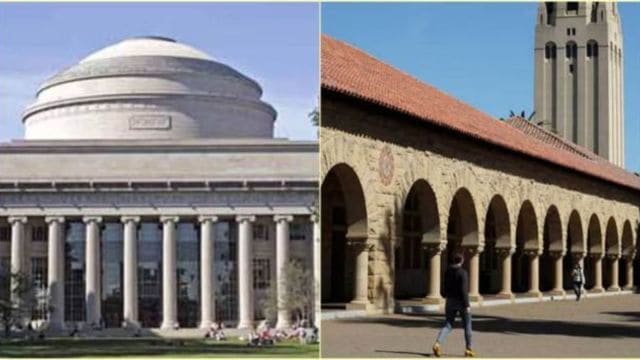© IE Online Media Services Pvt Ltd
Latest Comment
Post Comment
Read Comments
 According to US News 2024, MIT is ranked #2, and Stanford University is #3 among national universities. (Representative image/ File)
According to US News 2024, MIT is ranked #2, and Stanford University is #3 among national universities. (Representative image/ File)— Dikshita Goel
In the Marvel universe, Tony Stark, aka Iron Man, isn’t just a superhero, he’s also a prodigy who graduated from MIT at 17 with a double major in physics and engineering. Do you ever wonder how Sundar Pichai, CEO of Google, carved his path to success? Well, his journey unfolded at the Stanford School of Engineering. According to US News 2024, MIT is ranked #2, and Stanford University is #3 among national universities.
MIT, nestled outside Boston in Cambridge, Massachusetts, focuses on scientific and technological research, spread across a campus divided into five schools and a college, each a crucible of innovation within an urban setting.
On the other hand, Stanford’s campus is located in Palo Alto, just 30 miles from the bustling metropolis of San Francisco. Enveloped in a suburban setting, its idyllic surroundings provide the perfect backdrop for students.
MIT boasts eight academic departments, two institutes, and an extensive network of research laboratories. It offers flexible degree options, ranging from aeronautics and astronautics to chemical and mechanical engineering. The emphasis is on holistic education, incorporating cocurricular and extracurricular programmes, professional initiatives, and interdepartmental collaborations.
Stanford stands out with 16 defined undergraduate majors and the option to design a personalised course of study. The departmental diversity includes aeronautics, bioengineering, computer science, and materials science. Its faculty pioneers blended courses that merge interactive learning with traditional lectures, fostering hands-on opportunities tailored to individual learning styles.
MIT primarily awards financial aid through the MIT Scholarship, a grant based on financial need and endowment funds. Approximately 58 per cent of undergraduates receive this aid, with a median scholarship of $63,729 for 2022–2023.
Stanford offers specialised scholarships like the Engineers in the Arts Scholarship, supporting students in pursuing music studies alongside engineering. Financially needy applicants officially declared in the School of Engineering can apply for this unique opportunity.
MIT’s undergraduate enrollment for 2023-24 included 232 international students, showcasing a highly competitive acceptance rate of 4 per cent. The admissions process focuses on holistic evaluations, considering factors beyond standardized test scores to ensure a diverse and dynamic student body.
Stanford mirrors MIT’s 4 per cent acceptance rate, emphasising superior academic achievement and the potential to contribute to technology, business, or society. Specific requirements and deadlines vary across departments, ensuring a tailored approach to evaluating prospective graduate students.
With over 450 co-curricular student organizations, MIT thrives on diversity. Students engage in many activities, from the Laboratory for Chocolate Science to the Science Fiction Society and the Puppy Lab. The culture at MIT encourages creativity, evidenced by the infamous “hacks” executed by students according to an informal code of ethics.
Stanford offers an array of student organizations, including the Stanford Pre-Business Association and the Stanford Solar Car Project. Housing approximately 25 per cent of the student body in Greek life, Stanford fosters an engaging campus life, further complemented by successful athletic programs and the award-winning Stanford Magazine.
Both MIT and Stanford exemplify a commitment to global impact through their respective initiatives. MIT’s MISTI program fosters intercultural connections and global innovation, addressing global challenges. Stanford’s global engineering program provides students with international exposure, offering internships in diverse cultural settings.
As students weigh their choices, the decision between MIT and Stanford extends beyond rankings. It’s about finding the right fit — MIT’s dynamic urban setting or Stanford’s tranquil suburban campus. Each institution offers a distinct, enriching journey, shaping the engineers of tomorrow.
(The writer is the Co-Director, Athena Consulting Center)
(In this ‘versus’ series by The Indian Express, we compare premier foreign colleges or universities and the prominent courses that they offer. You can read the stories here.)